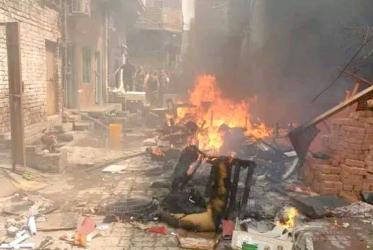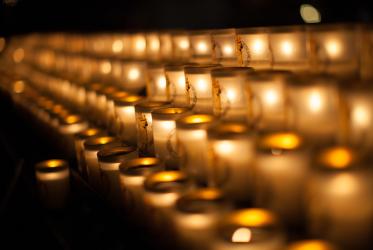See also: Letter from the members of the US conference of the WCC to th WCC Assembly
To: Members of the US Conference for the WCC
Geneva, 8 May 2006
"If we say that we have no sin, we deceive ourselves, and the truth
is not in us. If we confess our sins, he who is faithful and just will
forgive us our sins and cleanse us from all unrighteousness."
(1 John 1:8-9 NRSV)
Grace and peace to the members of the US Conference for the WCC, and to the people of the United States of America.
The 9th Assembly of the World Council of Churches, meeting at Porto Alegre, Brazil in February 2006, asked me to respond to your statement to the assembly, offered as a prayer of lamentation and confession. In responding, we too must join sincerely in your expression of grief at ill-conceived actions and tragic events of recent years, and in your confession "that we have failed to raise a prophetic voice loud enough and persistent enough" to bring about positive transformation, and that "we ourselves are complicit in a culture that diminishes the earth." We join you in these prayers to the Lord for mercy, and for peace.
Addressing terrorism in its many forms, the 9th Assembly affirmed that the World Council of Churches must continue to "accompany and support the churches as they respond prophetically and creatively in a pastoral and prophetic mission to assist those that are caught up in fear." This we are eager to do, and we are grateful for the US churches' statement as evidence of your continuing commitment to fellowship in faith, witness and action.
The form, content and tone of your statement to the 9th Assembly are reminiscent of documents foundational to the World Council of Churches. It is written in the spirit of love for the whole fellowship of churches, as invoked by the encyclical of the Ecumenical Patriarchate addressed "unto the churches of Christ everywhere" in January 1920, and appeals for that mutual understanding which will prevent the "increasing and widening of existing dissensions". And, like the Stuttgart declaration by German Protestants following the second world war, your statement "applies the formula of the confession of guilt used in public worship to a politically disastrous situation" and asks forgiveness from God, who alone redeems our lives and assures our future. It was in this context, in the aftermath of war, that the 1st Assembly of the WCC adopted these lines from its Assembly Message to the churches and the world:
There are millions who are hungry, millions who have no home,
no country and no hope. Over all mankind hangs the peril of total
war. We have to accept God's judgment upon us for our share in the
world's guilt. Often we have tried to serve God and mammon, put
other loyalties before loyalty to Christ, confused the Gospel with our
own economic or national or racial interests, and feared war more than
we have hated it. As we have talked to one another here, we have
begun to understand how our separation has prevented us from receiving
correction from one another in Christ. And because we lacked this
correction, the world has often heard from us not the Word of God but
the words of men.
But there is a word of God for our world. It is that the world is in the
hands of the living God, Whose will for it is wholly good; that in Jesus
Christ, His incarnate Word, Who lived and died and rose from the dead,
God has broken the power of evil once for all, and opened for everyone
the gate into freedom and joy in the Holy Spirit; that the final judgment
on all human history and on every human deed is the judgment of the
merciful Christ; and that the end of history will be the triumph of His
Kingdom, where alone we shall understand how much God has loved the
World. This is God's unchanging word to the world.
Confession is essential to the life of humanity, and to our fellowship in the ecumenical movement: this consists of confession of our sinfulness and many failures, yet also confession of faith in the power of God to overcome our sin and to transform us and the world around us. The apostle Paul recognized that "whenever I am weak, then I am strong" (2 Cor. 12:10), for the admission of our impotence and lack of vision forces us to rely on the power of God and the wisdom of God.
When we admit our need for help, we realize our need both for the blessings of providence and for one another. This is the power of the ecumenical movement - to be open to one another, and learn from one another.
Inspired in no small part by the statement of the US Conference, the 9th Assembly adopted a Message that included a frank admission of our common sin:
"We confess before you and all people:
We have been unworthy servants.
We have misused and abused the creation.
We have wounded one another by divisions everywhere.
We have often failed to take decisive action against environmental destruction,
poverty, racism, caste-ism, war and genocide.
We are not only victims but also perpetrators of violence."
"In all this, we have fallen short as disciples of Jesus Christ
who in his incarnation came to save us and teach us how to love.
Forgive us, God, and teach us to forgive one another.
"God, in your grace, transform the world."
Responding to concerns voiced by the US churches and others regarding violence and impunity, poverty and globalization, threats to the ecological systems of creation, the Message of the 9th Assembly continues:
"God, hear the cries of all creation,
the cries of the waters, the air, the land and all living things;
the cries of all who are exploited, marginalized, abused and victimized,
all who are dispossessed and silenced, their humanity ignored,
all who suffer from any form of disease, from war
and from the crimes of the arrogant who hide from the truth,
distort memory and deny the possibility of reconciliation.
"God, guide all in seats of authority towards decisions of moral integrity.
"God, in your grace, transform the world."
All this is set within the context of a confession of faith in the Triune God, who both forgives our trespasses and empowers us for good. And so our prayer leads us to new acts of dedication, new attempts to raise a prophetic voice loud enough and persistent enough to be noticed in this world:
"By the power and guidance of your Holy Spirit, O God,
may our prayers never be empty words
but an urgent response to your living Word -
"in nonviolent direct action for positive change,
in bold, clear, specific acts of solidarity, liberation, healing and compassion,
readily sharing the good news of Jesus Christ
"
Transform us in the offering of ourselves
so that we may be your partners in transformation
to strive for the full, visible unity of the one Church of Jesus Christ,
to become neighbours to all,
as we await with eager longing the full revelation of your rule
in the coming of a new heaven and a new earth."
As I have said before, I believe that the twenty-first century will be a period of time in which spirituality will once more take centre stage in human lives. Your statement to the 9th Assembly, phrased in the form of a prayer, is inspirational to us all and calls each of us to reflection and prayer and invites us to admit our own mistakes and imperfections.
And, with the assurance that we are forgiven in Christ, we are bold to echo the sentiments of the Message of the WCC's 1st Assembly in 1948:
It is not in our power to banish sin and death from the earth, to create the unity of the Holy Catholic Church, to conquer the hosts of Satan. But it is within the power of God. God has given us at Easter the certainty that God's own purpose will be accomplished. But, by our acts of obedience and faith, we can on earth set up signs which point to the coming victory. Till the day of that victory our lives are hid with Christ in God, and no earthly disillusion or distress or power of hell can separate us from the love of God in Jesus Christ our Lord.
As those who wait in confidence and joy for their deliverance, let us give ourselves to those tasks which lie to our hands, and so set up signs that all may see.
And may the blessing of the Triune God be with us all, and remain with us always,
Rev. Dr. Samuel Kobia
General Secretary


